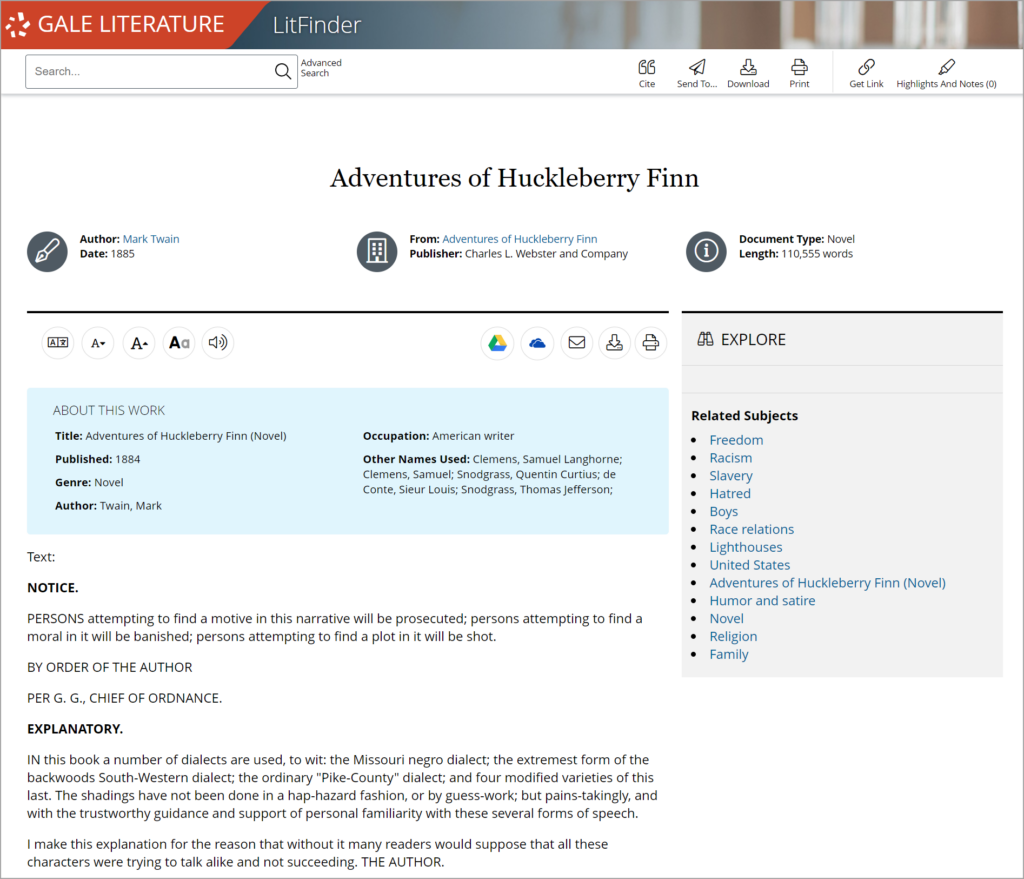| By Gale Staff |
Banning books may seem outdated, but many educational authorities and politicians continue to challenge what public and school librarians can add to bookshelves. In 2022, the American Library Association (ALA) Office of Intellectual Freedom shared that formal opposition to “unique” titles doubled from the previous year. Many of those books include main characters of color and touch on racial or LGBTQ+ themes. According to one article from NPR, public libraries are just the latest battleground for the country’s unflagging culture wars.
To raise awareness, ALA observes an official Banned Books Week each year, encouraging everyone to participate, from teachers to publishers to librarians to readers. Anyone can get involved, and many strategies exist to help counter book bans. In 2023, ALA is hosting Banned Books Week during October 1–7. This year’s theme is “Let Freedom Read”—a direct rebuttal to those who seek to limit freedom through censorship. Interested in getting involved? Here are some ideas and helpful information to get you started.
The History of Literary Censorship
Book bans are hardly new. For centuries, authority figures have attempted to get rid of titles that challenged the traditional values of those in power. Before the advent of the printing press, destroying controversial books was relatively easy. But once Gutenberg made widespread printing available, those seeking to suppress certain titles sought new strategies. Throughout the fifteenth and sixteenth centuries, Germany opened an official censorship office, England’s King Henry XIII banned his subjects from reading foreign books, and the Roman Catholic Church published a list of banned books.
In the seventeenth century, Puritans in Massachusetts facilitated book burnings. The 1873 Comstock Law forbade the U.S. Post Office from mailing morally questionable titles, including well-known works by F. Scott Fitzgerald and James Joyce. Germany’s Nazi regime and South Africa’s Apartheid leaders employed strict book bans too. Today, despite how progressive their ideals are, countries continue to find ways to control what their citizens read. However, if history shows us anything, it’s that whatever content a book contains, censorship and bans by those in power are not justifiable responses.
The Current Threat to the First Amendment in Libraries
Libraries play an essential role in addressing equality issues in the United States. These institutions are pillars of democracy, helping everyone access ideas and resources regardless of their background. We no longer live in a time where controversial stories are limited to the book covers that bind them. Nonetheless, raising awareness about bans and embracing new ideas and identities is still important.
To better understand the reality of censorship, PEN America, a nonprofit organization working to defend free expression through literature, tracks modern-day legislation in the United States that leads to book bans. Authority figures pressure school districts and librarians to remove titles from their shelves. Some states pursue legal action against the libraries that don’t comply and even threaten to shut their doors. In some cases, controversial YA or children’s books are moved to adult literature spaces, which, while less severe, still carries the spirit of limiting access.
Strategies for Pushing Back Against Book Banks
What can you do? Here are some ways public librarians are pushing back against censorship and other popular ideas for celebrating Banned Books Week.
- Feature Banned Titles: ALA releases a list of the year’s most challenged titles each fall. See if your library owns or can readily source those books and place them in positions of note within your library. If you live where this action could compromise your job, you could share a list of the banned titles instead.
- Read Banned Books: The most important action we can take for Banned Books Week is to check out and read these titles. Whether you form a book club or read a few chapters each night, find a way to learn and challenge yourself through the content. Ask—why is this book so controversial? What does it say about our communities that we don’t want people exposed to the book’s themes?
- Address the “Controversy” Head On: Book bans aim to shield readers from certain ideas, so why not focus on those themes? Librarians could host events and invite speakers to address the books’ controversial themes, facilitate discussions that celebrate racial and gender diversity, and showcase additional titles that touch on more delicate themes like sexual orientation. Introduce new characters and role models that challenge the norm to your readers. Encourage your patrons to be comfortable with discomfort and help your community grow.
- Get #BannedBooksWeek Trending: Help spread the word about Banned Books Week through your social media channels. Your library can share recommendations from the banned books list, encourage your patrons and community partners to post about their favorite controversial books, and include #bannedbooksweek on your posts to get titles trending. Popular banned titles include To Kill a Mockingbird, The Perks of Being a Wallflower, The Catcher in the Rye, and The Hunger Games.
Gale Resources You Can Utilize
Explore the resources below for more ideas to help engage readers and students with the topic of banned books during Banned Books Week.
- Find a dedicated Banned Books portal within Gale In Context: High School featuring a summary that integrates critical thinking prompts and dozens of related articles.
- Introduce readers to authors who frequently make the banned books register, such as Toni Morrison and Judy Blume, with biographical content in Gale In Context: Biography.
- Inform patrons and students about disinformation with a special collection in Gale In Context: Opposing Viewpoints.
- Share full-text versions of many well-known banned books, such as The Adventures of Huckleberry Finn, plus scholarly explanations and academic criticisms, in Gale Literature: LitFinder.

This October, help celebrate the freedom to read books and express ideas, especially those that challenge the status quo or spark controversy. Banned books should push readers beyond their comfort zones. Stretching our preconceived beliefs is how we grow. Banned titles often include valuable themes about tolerance and empathy—lessons from which we could all benefit.
Lean on Gale’s databases to help you spread the word about Banned Books Week. If your library isn’t a current subscriber, contact your Gale representative to learn more about our resources. For more information, including banned titles from previous years, Banned Books Week artwork, free downloadable materials, and additional ideas, check out ALA’s Banned Books Week Press Kit and visit the Banned Books Week Coalition’s official website.

